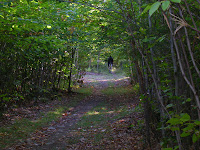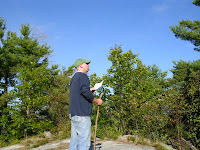Oh, look, someone is horseback riding. They must have left the horse in the clearing.
Hmm, that's very tall and lanky for a horse. And dark. Is it a mule?
Slowly the creature turned its head to look back at us. It had antlers.
Oh. Dear.
It's. A. Moose.
A huge bull moose was staring at us. I froze and whispered to Ickie to stop, pointing ahead. We began to back away cautiously.
The moose turned to consider us a few more times, then sauntered up the trail and disappeared. I turned to Ickie and cursed quietly.
We waited a very long time before moving on. After that, the hike ranged from moderate to strenuous, but I told Ickie I was burning twice as many calories because my insides were still quivering with fear. We dubbed this form of exercise "Terror Exercise." Every time a squirrel or woodpecker moved in the bushes after that, we freaked out all over again.
After we returned home, Ickie looked online and discovered that fall is when bull moose are in rut and the most dangerous. Thank goodness we didn't douse ourselves with Eau de Female Moose before leaving the house.
Other tips suggested that if attacked by a moose, one should:
1. Increase the distance between you and the moose.
2. Get behind a tree.
3. Change your route.
I find the "get behind a tree" advice morbidly amusing. Unless there's a redwood nearby, I don't see how it could protect me very well from a 2,000-pound moose. However, it is recommended to make a lot of noise while hiking, and we had enough sense to do that.
Moose exits, stage right.

I practice self defense.

Ickie is startled by a squirrel that sounds like a moose.






